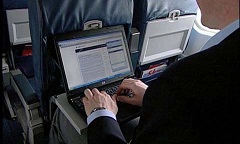Stop press! SIMs now available for iPhone4 and iPad! Micro vSIMs can be ordered - just add a comment on yourapplication!
BlackBerries blocked - an on-going story
Research in Motion's (RIM) BlackBerry range of handsets has long been the leading corporate e-mail platform for frequent travellers, with its efficient, secure (encrypted) e-mail and messaging services.
 However clouds are appearing on the horizon. Some countries are threatening to "turn off" BlackBerry functions. The UAE (home to Dubai and Abu Dhabi) has announced that BlackBerry e-mail, instant messaging, internet browsing and social networking will be disabled in October. Saudi Arabia announced that BlackBerry Messenger will be disabled from later this month, but a deal has been reached to place servers inside the country to allow message monitoring. India gave a deadline of the end of August to RIM to allow access to encrypted messages. Kuwait, Bahrain, Lebanon and Indonesia are also reported to be having problems with BlackBerry services.
However clouds are appearing on the horizon. Some countries are threatening to "turn off" BlackBerry functions. The UAE (home to Dubai and Abu Dhabi) has announced that BlackBerry e-mail, instant messaging, internet browsing and social networking will be disabled in October. Saudi Arabia announced that BlackBerry Messenger will be disabled from later this month, but a deal has been reached to place servers inside the country to allow message monitoring. India gave a deadline of the end of August to RIM to allow access to encrypted messages. Kuwait, Bahrain, Lebanon and Indonesia are also reported to be having problems with BlackBerry services.
The UAE telecoms regulator stated that the reason is that BlackBerry services "operate beyond the enforcement" of local security regulations (the regulator stated that despite negotiating since 2007, they were unable to get RIM's cooperation to the level enjoyed by UK, USA and even Chinese telecoms regulators). RIM warned BlackBerry users a year ago that software distributed by Etisalat, a UAE mobile operator, was actually spyware. It is likely that RIM will install servers in at least one or more countries as a result, which may prevent blocking, and may provide encryption keys for local BlackBerry subscribers.
Whilst we'll keep you informed, get an update before roaming with a BlackBerry. It would also be prudent not to send or receive any information that you would not want the local government to see.
Join Australia's smartest travellers and reduce your global roaming costs!
- Click here to see vRoam's coverage & rates -
vRoam now offers global vSIMs for overseas travellers no matter where in the world they travel.
vRoam's vSIM average savings are over 50% compared to Optus, Telstra, Vodafone and 3!
WiFi on planes
Wi-Fi connections in the air may not be the magical service capability that some in the travel world had hoped. Although airlines and providers of the service says they're pleased with consumer response, some analysts estimate that perhaps less than 10% of the passengers who could use Wi-Fi to log on to the Internet actually are doing so. Even that estimate may be inflated by discounts and free introductory periods.
Part of the problem is likely to be the premium pricing. That could be too much even for some business travelers. Business Travel News recently surveyed corporate travel managers and found that only about a third of the companies that responded reimburse their corporate travellers for in-flight Wi-Fi expenses.
The industry disputes the notion that Internet access on planes isn't taking off. Wi-Fi access has been available only about 18 months and on only about 950 mainline commercial jets — less than a third of the U.S. fleet (where it is most concentrated), rising to nearly 2,000 U.S. planes will be equipped end 2010.
But many travellers feel that Wi-Fi isn't a matter of price, but of value and therefore decline to log in on short flights, preferring to wait till the landing. There are other reasons some travellers aren't logging on. "I choose not to use Wi-Fi on a flight," says Bill Wahler, sales manager for a Chicago staffing firm. "I don't need to be connected 24/7/365. I may be a road warrior, but I have to have some 'me' time, too."
We take them for granted these days, but do you know what was the first mobile phone? Perhaps that used by Lars Magnus Ericsson (the founder of the company of the same name) who had a telephone in his car in Sweden in 1910. He had to stop near an overhead telephone line and connect using two long wires.
The idea of patching vehicle mounted radios, incorporating certain modifications, to the telephone network was evolved and tested by the Swedish police in 1946 for use in police cruisers. It drew so much current (these were the days of vacuum tubes) that the car battery would run out after half a dozen calls were made.
Towards the end of 1940s, so called radio-telephones began to be available publicly in the United States. Since the switching technology was not as advanced as it is today, these phones had to be manually patched into telephone network for the purpose of meaningful communication. These weighed around 20kg and were most often used in cars.
The first portable mobiles had to wait for the invention of the transistor, so in Moscow in 1957 Leonid Kupriyanovich (right) built the LK-1 which weighed around 500g and had a range of 30km and a battery life of 20 hours - not too shabby even by today's standards. It had a rotary dial and the associated base station could handle several users at a time.
Kupriyanovich (right) built the LK-1 which weighed around 500g and had a range of 30km and a battery life of 20 hours - not too shabby even by today's standards. It had a rotary dial and the associated base station could handle several users at a time.
The first truly mobile network (where users could move around freely and not stay in one base-station's range) was foreshadowed by Motorola's Martin Cooper (left) who made the first call in 1973. Cooper and Kupriyanovich probably jointly deserve the accolades for inventing the mobile phone.

No comments:
Post a Comment